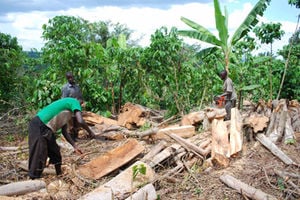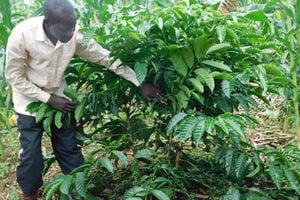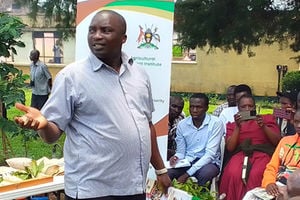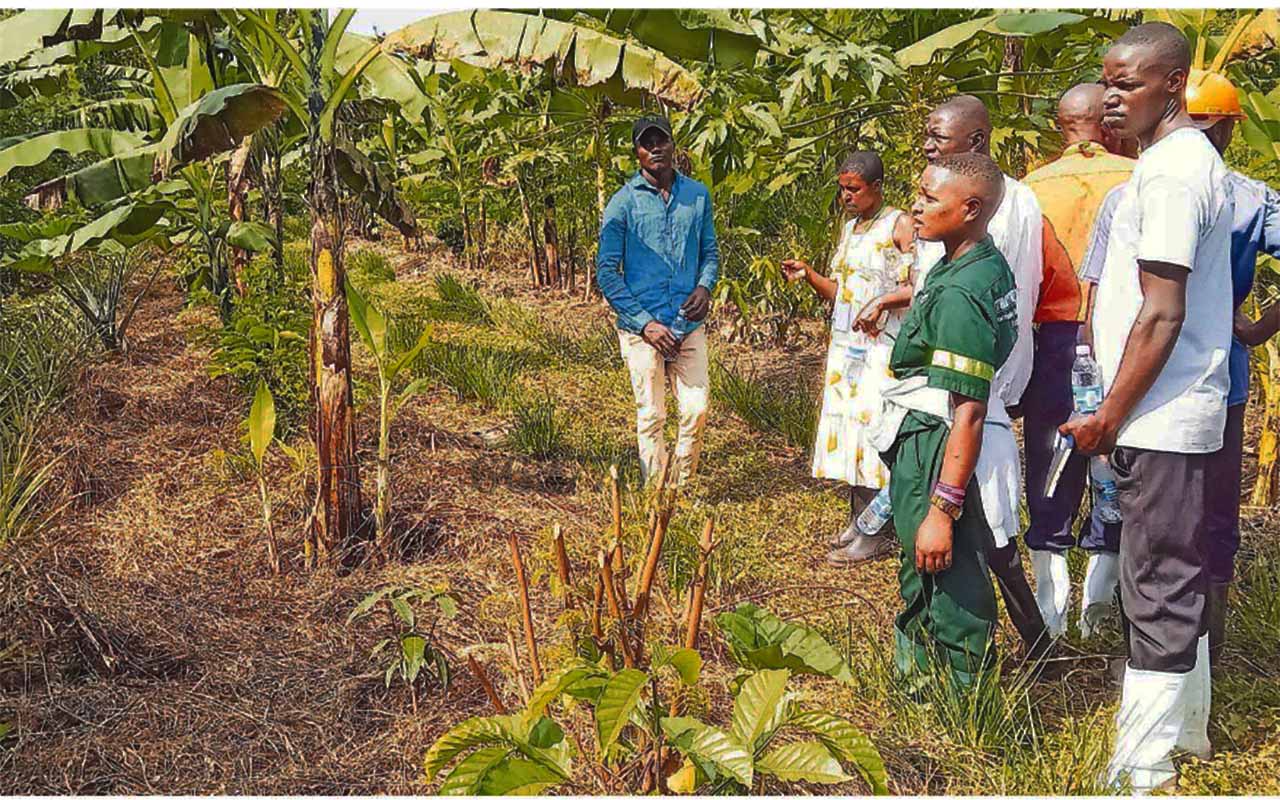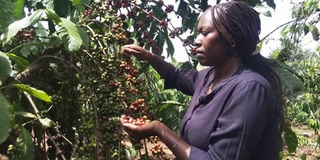
Ruth Kasigi harvests coffee in their plantation in Mpigi. PHOTO/george katongole
Amos Kasigi, a coffee farmer, trader, and processor in Mpigi District, has transformed his humble beginnings into a thriving coffee empire.
As the CEO of The Edge Trading Company and chairman of the Uganda Quality Coffee Traders and Processors Association, Kasigi is a leading figure in the Ugandan coffee industry.
Born into a farming family, Kasigi’s journey to coffee success began after a brief stint in the corporate world. Armed with a Diploma in Business Studies, he gained experience in the coffee sector before venturing into the import-export business with his wife, Ruth. However, their true passion lay in coffee, leading them to return to Uganda and establish their own coffee farm in 2015.
“Even if someone has a big investment, starting smaller is okay. Even if your plan is to establish 100 acres, start with at least 10 acres and add on every season. If you plant too much, you can lose your seedlings,” Kasigi says.
Starting with just four acres, today, their farm spans nearly 40 acres and serves as a model for other farmers. Kasigi emphasises the importance of starting small and gradually expanding, sharing valuable insights on coffee cultivation. Ruth, a former British Red Cross employee, plays a crucial role in managing the farm and ensuring its success.
The couple’s commitment to quality and sustainability is evident in their farming practices. By intercropping with bananas and maize and recently adding cocoa, they have diversified their income while maintaining soil health.
They also employ agronomists to manage pests and diseases and work closely with the Uganda Coffee Development Authority (UCDA) to stay updated on industry trends.
Sustainability
Kasigi underscores the importance of sustainable farming practices, beginning with a well-thought-out plan. “A solid fertilisation strategy is crucial. Using manure can significantly reduce reliance on costly artificial fertilisers,” he says.
However, like many coffee farmers worldwide, Kasigi is grappling with the intensifying impacts of climate change. Shifting rainfall patterns, soaring temperatures, and an upsurge in pests and diseases pose significant challenges to his farm. Even the digging of two shallow wells proved futile during the previous dry season.
“Unpredictable weather is wreaking havoc on our coffee. Blossoms often fail to develop into beans during dry spells, severely impacting yields and quality,” he says. He notes a discernible shift in rainfall patterns, with the traditionally bountiful December rains becoming less reliable. “Our main harvest in this area of Mawokota used to be in December, but now the May to July period is yielding more coffee,” he observes.
However, he is demonstrating remarkable resilience and innovation in adapting to these new realities.
One key strategy for him is the adoption of more resilient coffee varieties. By cultivating plants better suited to fluctuating rainfall, he is able to increase chances of a successful harvest. Additionally, he is engaged in agroforestry practices by planting shade trees especially Albizia Coriaria trees (mugavu) and barkcloth figs among coffee crops to regulate microclimates and reduce soil erosion.
He also employs improved water management techniques, such as mulching and contour planting to be able to conserve water during dry spells. He has also turned to organic farming methods to enhance soil health and overall farm resilience. Kasigi has also dug a shallow well which he uses for irrigation purposes.
Beyond individual farm practices, community and support networks play a crucial role in climate adaptation. Cooperatives and associations offer farmers access to vital resources, training, and market opportunities.
Knowledge sharing among farmers is also essential, as they learn from each other’s experiences and develop effective coping mechanisms. Government support, including financial assistance, training programs, and access to climate-smart technologies, can significantly boost farmers’ adaptive capacity. He is also adopting intercropping by growing other crops alongside coffee. He has also ventured into ecotourism, offering farm tours and experiences to visitors.
Additionally he is involved in processing and selling value-added coffee products, such as roasted beans and specialty coffee to enhance profitability.
The cutting edge
Kasigi’s vision extends beyond his own farm. In 2017, he established a demonstration farm to share knowledge with local farmers.
“We wanted to ensure our community planted more drought and disease-resistant coffee varieties,” he explains. The farm also produces seedlings and exports coffee, generating additional income.
The company’s commitment to value addition led to the establishment of a coffee processing mill in 2022, capable of processing 1.2 tonnes per hour.
“By encouraging farmers to sell FAQ (Fair Average Quality) coffee instead of raw green beans, they can significantly increase their earnings which is the top priority of poverty alleviation programs in Uganda,” Kasigi says.
The Edge Trading Company, formally established in 2011, works directly with over 2,130 farmers in Mpigi and purchases coffee from more than 7,000 traders. The company operates buying centers in Mpigi, Kyankwanzi, and Kalungu. To support farmers, The Edge Trading offers seedling discounts and employs community facilitators to provide agricultural guidance.
“We’re transforming coffee farming from a subsistence activity into a profitable business. By empowering farmers with knowledge and resources, we’re building a sustainable coffee industry together,” Kasigi emphasises.
Quality control
Ensuring quality control is paramount for Kasigi as a coffee buyer in order to maintain their reputation and customer satisfaction in the European (Italy and Germany) markets. The Edge Trading has a robust quality control strategy from pre-purchase assessment to post-purchase verification.
The company has qualified quality control personnel at their primary processing facility. They are involved in pre-purchase quality assessment to evaluate coffee beans. This includes detailed sampling and cupping to analyse flavour profiles and aroma. Laboratory analysis ensures adherence to international coffee standards by assessing factors like moisture content and defect count. Furthermore, they conduct regular farm visits to evaluate cultivation practices, harvesting methods, and post-harvest handling. By also providing training and support to local farmers and empowering them to improve their practices has improved coffee quality.
“We try to give all our farmers feedback about their coffee. It’s a requirement to improve quality and encourage farmers to abide by agreed quality,” he said. Rigorous inspections including verification of hygiene and equipment, are also carried out regularly. This is done through collaboration with independent quality control agencies for pre-shipment inspections.
Kasigi says they plan to go for single farm markets. Single farm coffee focuses on showcasing the distinct flavour profiles and qualities of coffee produced on individual farms. This emphasises traceability, transparency, premium pricing and direct farmer benefits. “Some of our farmers have shown very good interest and they are adhering to standards. So those farmers that can produce above four tonnes of green beans can be entered into the single farm markets to the European buyers. If we get into those markets farmers will be very happy because it attracts premium market prices,” he said.
They have certified almost 10,000 coffee farmers for the Rainforest Alliance to encourage committed sustainable and ethical coffee production.
Challenge
Despite a promising outlook, Kasigi acknowledges the significant hurdle posed by the European Union’s Forest-Free Regulation (EUDR). Complying with the mandate to prove that coffee products are deforestation-free is a complex challenge for the industry.
The regulation which targets commodities such as coffee, cocoa, soy, palm oil, and timber within the EU has significant implications for the coffee industry. Export companies must demonstrate the origin of their coffee, tracing it back to the specific farm or plantation. The coffee must also have been produced on land that was not forested after December 31, 2020.
Kasigi says that although coffee produced in compliance with the EUDR is likely to command a premium price, they are working on sustainable practices with farmers to implement traceability systems.
“We’re working on our systems to be able to restructure the supply chains and ensure compliance,” he says.
